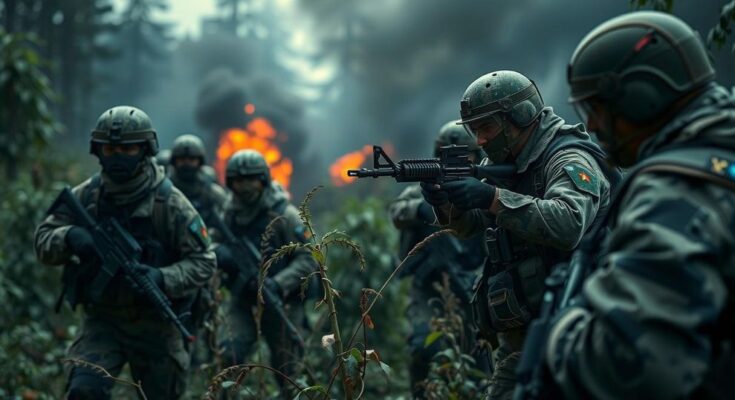Fighting has resumed in eastern Congo, violating a ceasefire as both the M23 rebel group and the Congolese army reported renewed hostilities. Accusations against Rwanda for supporting the M23 persist, though Rwanda denies such claims. A meeting between the Congolese and Rwandan presidents is scheduled for December 15, reflecting ongoing diplomatic efforts in the region.
Fighting in eastern Congo resumed on Monday, breaking a ceasefire, as both the M23 rebel group and the Congolese army confirmed the renewed hostilities. The Tutsi-led M23 has increased its insurgency efforts since 2022, with accusations from the Democratic Republic of Congo and the United Nations alleging that Rwanda supports the group with troops and armaments. While Rwanda denies these claims, U.N. experts reported that between 3,000 to 4,000 Rwandan forces operate in eastern Congo in conjunction with the M23.
Following a recent meeting on November 25, the foreign ministers of Congo and Rwanda outlined disengagement terms for Rwandan troops. The M23 confirmed fighting resumed on Tuesday, taking place shortly after statements from the Congolese army. A meeting between the presidents of Congo and Rwanda is scheduled for December 15, as announced by Angolan state news, marking their first official talks since 2023. Although the M23 claimed to maintain a ceasefire established in March 2023, they are not participating in discussions between Rwanda and Congo. In early November, the United States expressed grave concern over the ceasefire breaches attributed to the M23 rebels.
The conflict in eastern Congo has historical roots, with the M23 insurgent group emerging from complex regional tensions, particularly involving Rwanda. The area is known for its ongoing instability, exacerbated by resource wealth that often fuels conflict. Recent escalations, particularly since 2022, have drawn international attention, leading to accusations against Rwanda for covertly supporting the M23, thereby complicating regional geopolitics. Efforts for peace, including proposed meetings between Congolese and Rwandan leaders, signify ongoing attempts to address these multifaceted issues. The involvement of foreign nations, alongside internal divisions, highlights the challenges faced in achieving a sustainable resolution to not only the immediate hostilities but the underlying causes of the conflict. International organizations like the United Nations play a crucial role in monitoring the situation and reporting security violations, while external diplomatic efforts seek to foster dialogue and cooperation between the involved parties.
In summary, the recent resumption of fighting in eastern Congo has raised serious concerns about the stability of the region, undermining previous ceasefire agreements. Despite international efforts to mediate, including obligations set forth in agreements between Congo and Rwanda, the situation remains volatile. The impact of external forces, particularly from Rwanda, complicates domestic security and peace initiatives. Thus, ongoing monitoring and diplomatic engagements remain essential to addressing the conflict and fostering a long-term resolution.
Original Source: www.usnews.com




